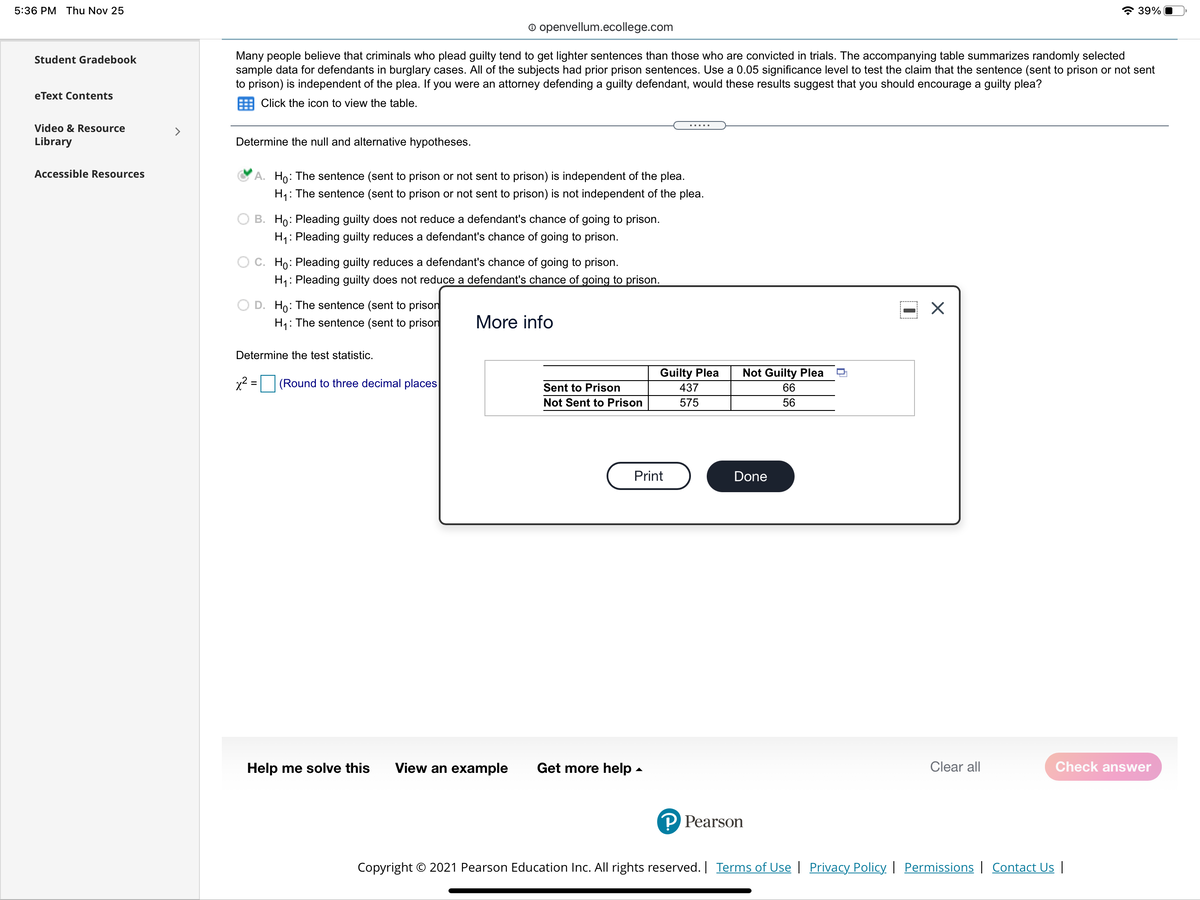Many people believe that criminals who plead guilty tend to get lighter sentences than those who are convicted in trials. The accompanying table summarizes randomly selected sample data for defendants in burglary cases. All of the subjects had prior prison sentences. Use a 0.05 significance level to test the claim that the sentence (sent to prison or not sent to prison) is independent of the plea. If you were an attorney defending a guilty defendant, would these results suggest that you should encourage a guilty plea? E Click the icon to view the table. Determine the null and alternative hypotheses. 'A. Ho: The sentence (sent to prison or not sent to prison) is independent of the plea. H: The sentence (sent to prison or not sent to prison) is not independent of the plea. O B. Ho: Pleading guilty does not reduce a defendant's chance of going to prison. H1: Pleading guilty reduces a defendant's chance of going to prison. OC. Ho: Pleading guilty reduces a defendant's chance of going to prison. H: Pleading guilty does not reduce a defendant's chance of going to prison. O D. Ho: The sentence (sent to prisor H: The sentence (sent to prison More info Determine the test statistic. Guilty Plea Not Guilty Plea 66 56 x? =O (Round to three decimal places Sent to Prison Not Sent to Prison 437 575 Print Done
Many people believe that criminals who plead guilty tend to get lighter sentences than those who are convicted in trials. The accompanying table summarizes randomly selected sample data for defendants in burglary cases. All of the subjects had prior prison sentences. Use a 0.05 significance level to test the claim that the sentence (sent to prison or not sent to prison) is independent of the plea. If you were an attorney defending a guilty defendant, would these results suggest that you should encourage a guilty plea? E Click the icon to view the table. Determine the null and alternative hypotheses. 'A. Ho: The sentence (sent to prison or not sent to prison) is independent of the plea. H: The sentence (sent to prison or not sent to prison) is not independent of the plea. O B. Ho: Pleading guilty does not reduce a defendant's chance of going to prison. H1: Pleading guilty reduces a defendant's chance of going to prison. OC. Ho: Pleading guilty reduces a defendant's chance of going to prison. H: Pleading guilty does not reduce a defendant's chance of going to prison. O D. Ho: The sentence (sent to prisor H: The sentence (sent to prison More info Determine the test statistic. Guilty Plea Not Guilty Plea 66 56 x? =O (Round to three decimal places Sent to Prison Not Sent to Prison 437 575 Print Done
MATLAB: An Introduction with Applications
6th Edition
ISBN:9781119256830
Author:Amos Gilat
Publisher:Amos Gilat
Chapter1: Starting With Matlab
Section: Chapter Questions
Problem 1P
Related questions
Question
What's the test statistic ? And the p-value?

Transcribed Image Text:5:36 PM Thu Nov 25
* 39% O
o openvellum.ecollege.com
Many people believe that criminals who plead guilty tend to get lighter sentences than those who are convicted in trials. The accompanying table summarizes randomly selected
sample data for defendants in burglary cases. All of the subjects had prior prison sentences. Use a 0.05 significance level to test the claim that the sentence (sent to prison or not sent
to prison) is independent of the plea. If you were an attorney defending a guilty defendant, would these results suggest that you should encourage a guilty plea?
Student Gradebook
eText Contents
Click the icon to view the table.
Video & Resource
.....
>
Library
Determine the null and alternative hypotheses.
Accessible Resources
A. Ho: The sentence (sent to prison or not sent to prison) is independent of the plea.
H: The sentence (sent to prison or not sent to prison) is not independent of the plea.
B. Ho: Pleading guilty does not reduce a defendant's chance of going to prison.
H,: Pleading guilty reduces a defendant's chance of going to prison.
Họ: Pleading guilty reduces a defendant's chance of going to prison.
H,: Pleading guilty does not reduce a defendant's chance of going to prison.
D. Ho: The sentence (sent to prison
H,: The sentence (sent to prison
More info
Determine the test statistic.
Guilty Plea
Not Guilty Plea
x2 = (Round to three decimal places
Sent to Prison
437
66
Not Sent to Prison
575
56
Print
Done
Help me solve this
View an example
Get more help -
Clear all
Check answer
P Pearson
Copyright © 2021 Pearson Education Inc. All rights reserved. | Terms of Use | Privacy Policy | Permissions | Contact Us |
Expert Solution
This question has been solved!
Explore an expertly crafted, step-by-step solution for a thorough understanding of key concepts.
This is a popular solution!
Trending now
This is a popular solution!
Step by step
Solved in 2 steps with 1 images

Recommended textbooks for you

MATLAB: An Introduction with Applications
Statistics
ISBN:
9781119256830
Author:
Amos Gilat
Publisher:
John Wiley & Sons Inc

Probability and Statistics for Engineering and th…
Statistics
ISBN:
9781305251809
Author:
Jay L. Devore
Publisher:
Cengage Learning

Statistics for The Behavioral Sciences (MindTap C…
Statistics
ISBN:
9781305504912
Author:
Frederick J Gravetter, Larry B. Wallnau
Publisher:
Cengage Learning

MATLAB: An Introduction with Applications
Statistics
ISBN:
9781119256830
Author:
Amos Gilat
Publisher:
John Wiley & Sons Inc

Probability and Statistics for Engineering and th…
Statistics
ISBN:
9781305251809
Author:
Jay L. Devore
Publisher:
Cengage Learning

Statistics for The Behavioral Sciences (MindTap C…
Statistics
ISBN:
9781305504912
Author:
Frederick J Gravetter, Larry B. Wallnau
Publisher:
Cengage Learning

Elementary Statistics: Picturing the World (7th E…
Statistics
ISBN:
9780134683416
Author:
Ron Larson, Betsy Farber
Publisher:
PEARSON

The Basic Practice of Statistics
Statistics
ISBN:
9781319042578
Author:
David S. Moore, William I. Notz, Michael A. Fligner
Publisher:
W. H. Freeman

Introduction to the Practice of Statistics
Statistics
ISBN:
9781319013387
Author:
David S. Moore, George P. McCabe, Bruce A. Craig
Publisher:
W. H. Freeman